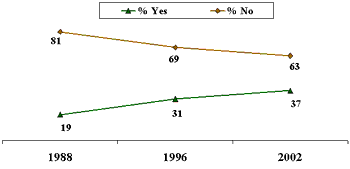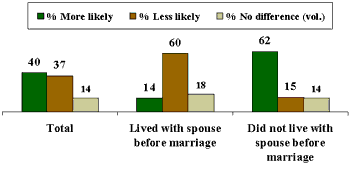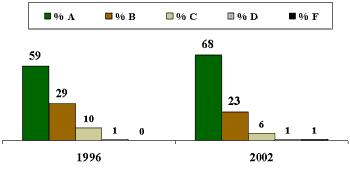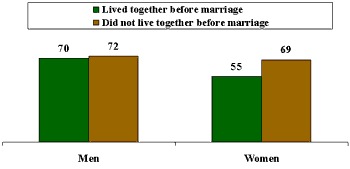GALLUP NEWS SERVICE
PRINCETON, NJ – Gallup polling shows that increasing numbers of Americans are living together prior to getting married. Recent academic studies have suggested that couples that live together before marriage are more likely to get divorced than those who do not live together. However, the findings are not universally accepted, as some believe that other factors beyond living together before marriage may explain the relationship. The nature of the controversy is underscored by the findings of a recent Gallup poll that shows Americans are divided as to whether pre-marital cohabitation leads to an increased likelihood of divorce. The poll also finds that a larger percentage of Americans are giving their marriages high grades, with those who did not live together before marriage slightly more likely to give their marriage a higher grade than those who did not. Attitudes toward marriage and living together are strongly influenced by one's values, including their political ideology and church-going habits.
Trends in Living Together Before Marriage
A review of Gallup polls conducted throughout 2002 indicates that about half of Americans are married (51%), another 6% are living with a partner, 9% are widowed, 14% are divorced or separated and 18% have never been married.
A July poll asked those who were married if they lived with their spouse prior to their marriage, updating a question that had been asked in 1988 and 1996. The data show a steady increase in the proportion of married Americans who say they lived with their spouse prior to tying the knot. When Gallup first asked the question in 1988, fewer than one in five married Americans said they lived with their spouse before marriage. The latest numbers show that percentage has nearly doubled to 37%.
| Did You and Your [Husband/Wife] Live Together Before You Got Married? |
 |
The increase is largely accounted for by the behavior of younger Americans (those under age 50), a majority of whom (51%) say they lived together prior to marriage. Among those over the age of fifty, only 15% say they lived with their spouse before getting married. The 1996 data showed that 41% of those under age 50 had lived with their spouse before marriage.
Does Living Together Help or Hurt a Marriage?
There is debate among scholars as to whether living together leads to a happy marriage or not. Proponents say it allows a test run before the marriage is official, or the arrangement helps the couple decide if they should get married at all. Opponents object on moral grounds, and believe that living together undermines the value of the marriage commitment. They also cite the research that suggests that those who live together prior to marriage are actually more likely to divorce than those who do not. Like the scholarly community, the American public is divided as to which arrangement is better, with 40% saying that couples that live together before marriage are more likely to divorce, 37% saying they are less likely to do so, and 23% not having an opinion.
Opinion is greatly influenced by what respondents themselves did, as a majority of those who lived together before marriage says it makes it less likely that a marriage will end in divorce, and a majority of those who did not live together say it makes it more likely that the marriage will fail.
| Are Couples That Live Together Before
Marriage More Likely To Get Divorced? |
 |
| July 22-24, 2002 |
It is clear that one's values also play a very important role in informing one's beliefs about living together.
- The most religious Americans-- those who attend church on a weekly basis-- are more than twice as likely as those who seldom or never attend church to believe that premarital cohabitation increases the odds of divorce (56% compared with 24%).
- By a two-to-one margin, self-described conservatives say living together before marriage makes divorce more (54%) rather than less likely (27%). In contrast, also by a two-to-one margin, liberals say living together is less likely to lead to divorce (52% to 26%).
- There are also differences by marital status, a plurality of those who are currently married (44%) say pre-marital cohabitation is more likely to lead to divorce, while a majority of those who have never married (53%) say it is less likely to do so. Those who are themselves divorced or separated are divided in their views, with 35% saying it makes divorce more likely, 35% saying less likely, and 30% not having an opinion in either direction.
- Younger Americans are far more likely to see benefits to living together before marriage. Only about one in three below the age of 50 say living together before marriage is more likely to lead to divorce, while a slim majority of those above age 50 believe this.
Rating Marriages in the United States
When asked to grade their marriage on an A to F scale, 68% rate it an A, 23% a B, and 6% a C. More Americans give their marriages an "A" grade now than in 1996, when 59% did so. On a four-point scale (with an A grade equivalent to a 4 and an F grade equivalent to a 0), the average grade for marriages in the United States is now 3.58, compared with 3.45 in 1996.
| Marriage Grades Comparison: 1996 to 2002 |
 |
Some groups are more positive than others when it comes to rating their marriages, specifically:
- Men give slightly higher grades to their marriage than women. Seventy-one percent of men give their marriage an A grade compared with 64% of women.
- Those with a college education are more likely to rate their marriage an A. Seventy-two percent of those with at least some college education give their marriage the highest mark compared with 59% of those with a high school education or less. Ratings are even higher among those with post-graduate educations, among whom 81% rate their marriage an A.
- More than seven in 10 conservatives give their marriage an A grade, compared with 58% of liberals.
- Those who did not live with their spouse prior to marriage are slightly more likely to give their marriage the highest rating than are those who lived with their spouse before getting married, by a 71% to 63% margin.
- Unlike other attitudes towards marriage, people's grading of their marriage is not related to the frequency with which they attend religious services.
The differences in marriage assessments between those who lived together before marrying and those who did not persists even when the differences due to ideology and education are taken into account. However, nearly all of the difference appears to be driven by the fact that women who did not live together prior to marriage are much more positive about their marriage than those who did (69% vs. 55%). Men show no difference in ratings of their marriage (70% vs. 72%) according to their living arrangements prior to marriage.
| Percentage of Married Men and Women Giving Their Marriage and ‘A' Grade |
 |
| July 22-24, 2002 |
However, the 1996 data do not show the same pattern. At that time, both men and women who did not cohabitate prior to marriage rated their marriages more positively than their counterparts who did live together. Sixty-four percent of men who did not live with their spouse prior to marriage gave their relationship an A grade, compared with 50% of those who previously lived with their spouse. Among women, 60% of those who did not live with their spouse prior to marrying them gave their marriage an A grade compared with 55% of those who did cohabit with their future spouse.
Survey Methods
These results are based on telephone interviews with a randomly selected national sample of 1,005 adults, 18 years and older, conducted July 22-24, 2002. For results based on this sample, one can say with 95 percent confidence that the maximum error attributable to sampling and other random effects is plus or minus 3 percentage points. In addition to sampling error, question wording and practical difficulties in conducting surveys can introduce error or bias into the findings of public opinion polls.
Using an A, B, C, D and F grading scale like they do in school, what grade would you give your marriage today?
BASED ON --522-- ADULTS WHO ARE CURRENTLY MARRIED
|
A |
B |
C |
D |
F |
No opinion |
|
|
% |
% |
% |
% |
% |
||
|
2002 Jul 22-24 |
68 |
23 |
6 |
1 |
1 |
1 |
|
1996 Sep 3-5 |
59 |
29 |
10 |
1 |
* |
1 |
Did you and your [husband/wife] live together before you got married or not?
BASED ON --522-- ADULTS WHO ARE CURRENTLY MARRIED
|
Yes |
No |
No opinion |
|
|
% |
% |
% |
|
|
2002 Jul 22-24 |
37 |
63 |
* |
|
1996 Sep 3-5 |
31 |
69 |
* |
|
1988 Dec 27-29 |
19 |
81 |
0 |
Do you think couples that live together before marriage are more likely or less likely to get divorced than couples that do not live together before marriage?
|
More |
Less |
No difference (vol.) |
No |
|
|
% |
% |
% |
% |
|
|
2002 Jul 22-24 |
40 |
37 |
14 |
9 |